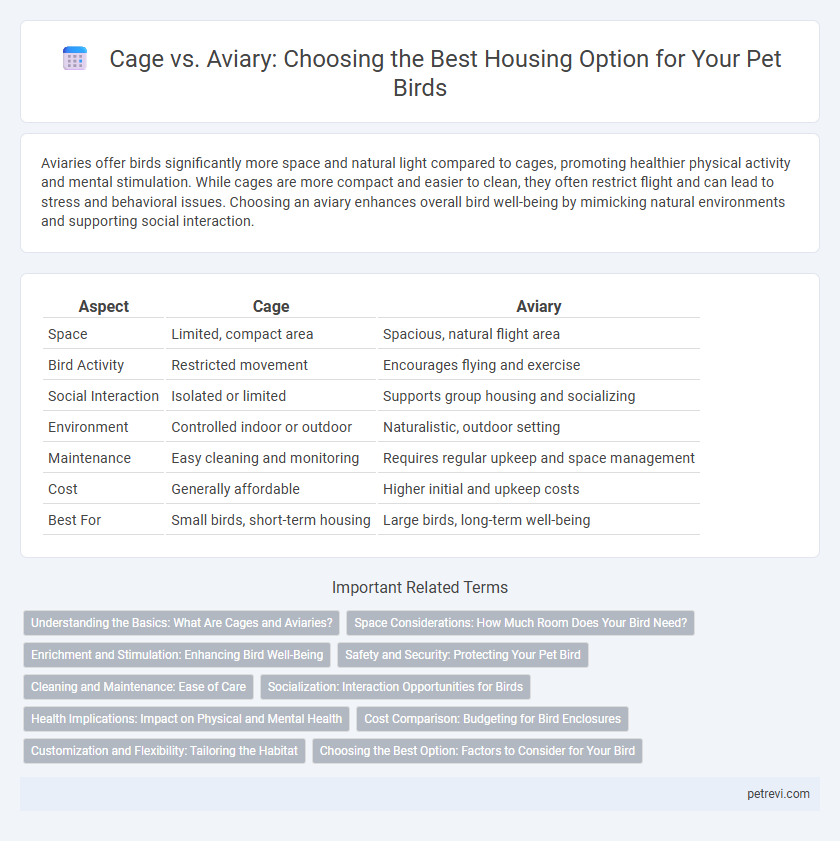Aviaries offer birds significantly more space and natural light compared to cages, promoting healthier physical activity and mental stimulation. While cages are more compact and easier to clean, they often restrict flight and can lead to stress and behavioral issues. Choosing an aviary enhances overall bird well-being by mimicking natural environments and supporting social interaction.
Table of Comparison
| Aspect | Cage | Aviary |
|---|---|---|
| Space | Limited, compact area | Spacious, natural flight area |
| Bird Activity | Restricted movement | Encourages flying and exercise |
| Social Interaction | Isolated or limited | Supports group housing and socializing |
| Environment | Controlled indoor or outdoor | Naturalistic, outdoor setting |
| Maintenance | Easy cleaning and monitoring | Requires regular upkeep and space management |
| Cost | Generally affordable | Higher initial and upkeep costs |
| Best For | Small birds, short-term housing | Large birds, long-term well-being |
Understanding the Basics: What Are Cages and Aviaries?
Cages are enclosed structures typically made of metal or plastic bars designed to house individual birds or small groups, offering limited space but easy maintenance and portability. Aviaries are larger, more spacious enclosures that simulate natural habitats, allowing birds to fly freely and engage in natural behaviors, enhancing their physical and mental health. Choosing between a cage and an aviary depends on species-specific needs, space availability, and the owner's goals for bird care and enrichment.
Space Considerations: How Much Room Does Your Bird Need?
Birds require ample space to maintain physical health and mental stimulation, with cages often restricting natural behaviors due to limited room. Aviaries offer significantly larger environments, allowing birds to fly, stretch their wings, and engage in social interactions, which are critical for species like parrots and finches. Optimal bird housing should exceed the minimum flight space requirements, providing at least twice the wingspan in all directions for safe and comfortable movement.
Enrichment and Stimulation: Enhancing Bird Well-Being
An aviary provides a larger, more naturalistic environment that significantly enhances bird enrichment and stimulation by allowing extensive flight and exploration opportunities. Unlike traditional cages, aviaries accommodate varied perches, plants, and interactive elements that promote physical activity and mental engagement essential for bird well-being. Proper use of aviaries reduces stress, prevents behavioral issues, and supports the cognitive development of species like parrots, finches, and canaries.
Safety and Security: Protecting Your Pet Bird
Aviaries offer enhanced safety and security for pet birds by providing a spacious, enclosed environment that minimizes stress and reduces the risk of injury compared to traditional cages. Their sturdy construction and secure, lockable doors help prevent escapes and protect birds from household hazards and predators. Properly designed aviaries also allow natural ventilation and light while keeping birds safe from harmful elements, supporting their overall well-being.
Cleaning and Maintenance: Ease of Care
Cages require frequent cleaning due to their compact size, making waste buildup more concentrated and harder to manage. Aviaries offer greater space, allowing for more natural waste dispersal and easier spot cleaning, reducing the frequency of full cleanings. Materials like stainless steel and removable trays in both options enhance hygiene and simplify maintenance tasks.
Socialization: Interaction Opportunities for Birds
An aviary offers a spacious environment that supports natural social behaviors by allowing multiple birds to interact freely, which enhances mental stimulation and reduces stress. In contrast, a cage, often limited in size, restricts social interaction and may lead to loneliness or behavioral issues if birds are kept isolated. Providing a bird with an aviary setup promotes healthier social engagement and overall well-being compared to traditional cages.
Health Implications: Impact on Physical and Mental Health
Aviaries provide birds with more space for natural behaviors, reducing stress and promoting better physical health through increased exercise. Cages often limit movement and social interaction, which can lead to obesity, muscle atrophy, and psychological issues like anxiety or depression. Ensuring adequate space and environmental enrichment in housing directly influences a bird's overall well-being and longevity.
Cost Comparison: Budgeting for Bird Enclosures
Cages typically cost less than aviaries, with basic bird cages ranging from $30 to $150 depending on size and materials, while aviaries often start at $500 and can exceed several thousand dollars for custom builds. Maintenance expenses for cages include occasional cleaning and replacement parts, whereas aviaries require more investment in structure upkeep, weatherproofing, and space for multiple birds. Budgeting for bird enclosures should consider initial purchase price, ongoing maintenance, and the bird's welfare, as aviaries provide more space for natural behaviors but demand a higher financial commitment.
Customization and Flexibility: Tailoring the Habitat
Aviaries offer superior customization and flexibility compared to traditional bird cages, allowing owners to tailor the habitat to the bird's specific needs such as space, perch variety, and environmental enrichment. Custom-built aviaries can incorporate specialized features like natural plants, varying perch heights, and interactive elements that promote physical and mental stimulation. This adaptability supports optimal bird health and behavior by providing a more natural and engaging living environment.
Choosing the Best Option: Factors to Consider for Your Bird
Choosing between a cage and an aviary for bird housing depends on factors such as the bird species, available space, and behavioral needs. Cages offer controlled environments suited for small birds and limited areas, while aviaries provide larger, enriched spaces ideal for larger or multiple birds requiring flight and social interaction. Consider size, safety, ventilation, and maintenance before selecting the optimal housing to promote your bird's health and happiness.
Cage vs Aviary for Bird Housing Infographic

 petrevi.com
petrevi.com